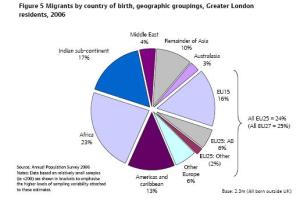 Located in the unlikely setting of Notting Hill, London the the Museum of Brands, Packaging and Advertising is a little gem. It is based on the collection of consumer historian, Robert Opie, who saw the need to record the history of products around us.
Located in the unlikely setting of Notting Hill, London the the Museum of Brands, Packaging and Advertising is a little gem. It is based on the collection of consumer historian, Robert Opie, who saw the need to record the history of products around us.
“Starting at the age of sixteen with a packet of Munchies, the Collection now extends to all aspects of daily life – toys, comics, magazines, newspapers, technology, travel, royal souvenirs, fashion and design. Robert says, ‘Whilst families tend to save mementos from special occasions, it struck me that little was being done to keep the everyday material. When the thousands of pieces of this social history are assembled into some giant jigsaw, the picture becomes clearer as to the remarkable journey we have all come through’. ”
The collection contains over 12,000 toys and games, posters and magazines, fads and fashions, postcards and packaging. There is a strong nostalgic aspect of the museum as you discover sweets and games from your youth. The history of consumer culture is revealed decade by decade from Victorian times to the present day.
Two things struck me during the visit. One, was the increase in size of packages over time. Presumably a combination of wealthier consumers and less frequent shopping. The other was the simplification of branding over time. They have a great series of displays showing the development of household names such as Swan Vesta matches and Branston Pickle over time. With each ‘brand refresh’ the colours and logo’s are made clearer and simpler.

The only disappointment for me was not being able to find an example of a Jacobs Club biscuit the dominant brand of the 1980’s with one of the most memorable advertising slogans, ‘If you like a lot of chocolate on your biscuit join our club’.

There was a good example of ‘passing off’, known as the Jif Lemon case, where Reckitt & Colman Ltd took Borden Inc to the House of Lords and won.
From an article by Kenneth Choy discussing the tort of passing off:
“In the summer of 1985, Borden began selling its ReaLemon product in its lemon-shaped container in the UK. Reckitt & Colman became concerned and filed a lawsuit to stop the American company. Reckitt & Colman was successful in the lower courts and Borden took the case to the House of Lords.
Explaining the standard, which became known as the classic trinity, Lord Oliver asked:
1. Have the respondents [Reckitt & Colman] proved that the get-up under which their lemon juice has been sold since 1956 has become associated in the minds of substantial numbers of the purchasing public specifically and exclusively with [their] (“Jif”) lemon juice?
2. If the answer to that question is in the affirmative, does the get-up under which the appellants [Borden] proposed to market their lemon juice in [the ReaLemon containers] amount to a representation by [Borden] that the juice which they sell is “Jif” lemon juice?
3. If the answer to that question is in the affirmative, is it, on a balance of probabilities, likely that, if the appellants [Borden] are not restrained as they have been, a substantial number of members of the public will be misled into purchasing the defendants’ lemon juice in the belief that it is the respondents’ Jif juice? (pp.500-501)
Lord Oliver observed that supermarkets tend to sell only one brand and possibly their own house brand of preserved lemon juice. He noted Reckitt & Colman’s survey evidence showing that “a housewife presented with a display of these products in close juxtaposition would be likely to pick up . . . the [ReaLemon] product in the belief that what she was buying was the respondents’ Jif lemon juice” (p. 500) since Jif was the only “lemon-sized squeezy pack of lemon juice on the market” (p. 501).
Concluding that the three elements are satisfied, the Lords affirmed the permanent injunction barring Borden from marketing lemon juice in lemon-shaped containers in the UK.
Had the Jif lemon been a registered trademark, the case would have been much simpler to prove. Infringement is established if it can show that Borden’s ReaLemon container is identical or similar to the Jif lemon and that allowing the ReaLemon container in the market is likely to cause public confusion. Section 18, Trade Mark Ordinance (Cap. 559).
One may ask, if the Jif lemon had been sold since 1956, why wasn’t it registered as a trademark?
The answer is that, had they applied to register the Jif lemon as a trademark, the application would have been rejected by the registrar. This is because a mark that is a symbol of the goods or services it promotes does not qualify for registration. So, the Jif lemon is a symbol of lemon and lemon juice so it cannot be registered. If it is registered, it would prevent others from using a symbol of a lemon to sell lemon or lemon juice. Thus, Reckitt & Colman could only resort to a passing off claim in their fight against competition from ReaLemon. “





 As I mentioned in my previous blog post on our first
As I mentioned in my previous blog post on our first  Although I felt I rambled on a bit, Alex seems to have kept most of the interview in the final edit. It is a mixture of chat about the Business & IP Centre and the role of Facebook and blogs to promote it to a new audience.
Although I felt I rambled on a bit, Alex seems to have kept most of the interview in the final edit. It is a mixture of chat about the Business & IP Centre and the role of Facebook and blogs to promote it to a new audience. So much for the film or TV series of the book, how about the dramatised promotional video of the book that has yet to be printed.
So much for the film or TV series of the book, how about the dramatised promotional video of the book that has yet to be printed. Mothers of Invention III kicked of with Jessica Huie, who at 17 years old discovered she was pregnant. Her father not happy, telling her that “you will only ever be a statistic”. This made a deep impression on Jessica and her subsequent successes are her way of showing him he was wrong.
Mothers of Invention III kicked of with Jessica Huie, who at 17 years old discovered she was pregnant. Her father not happy, telling her that “you will only ever be a statistic”. This made a deep impression on Jessica and her subsequent successes are her way of showing him he was wrong.